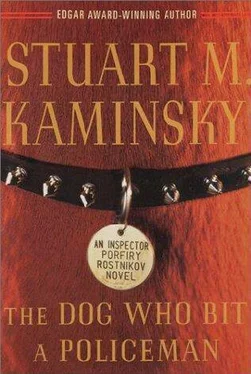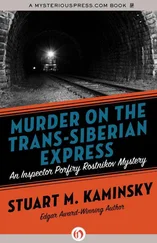Stuart Kaminsky - The Dog Who Bit a Policeman
Здесь есть возможность читать онлайн «Stuart Kaminsky - The Dog Who Bit a Policeman» весь текст электронной книги совершенно бесплатно (целиком полную версию без сокращений). В некоторых случаях можно слушать аудио, скачать через торрент в формате fb2 и присутствует краткое содержание. Жанр: Полицейский детектив, на русском языке. Описание произведения, (предисловие) а так же отзывы посетителей доступны на портале библиотеки ЛибКат.
- Название:The Dog Who Bit a Policeman
- Автор:
- Жанр:
- Год:неизвестен
- ISBN:нет данных
- Рейтинг книги:3 / 5. Голосов: 1
-
Избранное:Добавить в избранное
- Отзывы:
-
Ваша оценка:
- 60
- 1
- 2
- 3
- 4
- 5
The Dog Who Bit a Policeman: краткое содержание, описание и аннотация
Предлагаем к чтению аннотацию, описание, краткое содержание или предисловие (зависит от того, что написал сам автор книги «The Dog Who Bit a Policeman»). Если вы не нашли необходимую информацию о книге — напишите в комментариях, мы постараемся отыскать её.
The Dog Who Bit a Policeman — читать онлайн бесплатно полную книгу (весь текст) целиком
Ниже представлен текст книги, разбитый по страницам. Система сохранения места последней прочитанной страницы, позволяет с удобством читать онлайн бесплатно книгу «The Dog Who Bit a Policeman», без необходимости каждый раз заново искать на чём Вы остановились. Поставьте закладку, и сможете в любой момент перейти на страницу, на которой закончили чтение.
Интервал:
Закладка:
There had been no hello, no identification, no small talk.
Rostnikov was sitting at his desk, drinking a cup of abysmal coffee after having just called the Leningradskaya Hotel and leaving a message for Casmir Chenko, Glahz, the one-eyed Tatar. He had no idea how long it would take to hear back from Chenko. In fact, he had no idea whether he would ever hear from him, which would mean the usual legwork.
And now, Lydia Tkach.
Sasha’s mother had been enough trouble when she was working at the Ministry of Information, but since her retirement, Rostnikov was convinced, Lydia had a daily checklist of those who required her scolding, which reminded all who knew her of the angry cawing of one of the big gray-and-white crows that ruled the bird world of Moscow.
The list of those most in need of scolding began with her own son and daughter-in-law. Lydia no longer lived with Maya, Sasha, and their two children, but she sat with the children while Maya and Sasha worked. This gave her certain privileges, such as camp-ing rights in the small apartment and the right to complain about child rearing, the dangers of her son’s job, and the temptations that faced her daughter-in-law in the workplace. But Lydia was an enigma, a hard-of-hearing enigma. Her grandchildren loved her, and Lydia had begun supplementing her son’s income.
Lydia had saved her money and her dead husband’s pension.
Through bits of information picked up in the ministry when she worked, she had invested in a variety of borderline legal activities and made a great deal of money, though she told no one how much she had.
Within days of the end of the Soviet Union, Lydia had bought a state bakery on the Arbat. She had hired a Turkish baker to provide not only bread, which she sold at a reasonable price, but also inexpensive and simple pastries and cookies. Business had boomed.
Lydia had hired, at Rostnikov’s suggestion, Galina Panishkoya, who had just been released from prison, a woman whose grandchildren Rostnikov and his wife had taken in. The woman and the grandchildren were living with the Rostnikovs until suitable arrangements could be made, a dim prospect. Rostnikov knew that he would be paying, in some way, for Lydia’s generosity. It was a price he was willing to pay, though there were moments when he wondered if he had made a pact with a dark angel.
However, the major mistake in the Lydia Tkach saga had been made by Anna Timofeyeva, Rostnikov’s former chief in the Office of the Moscow Procurator. Anna had been forced to retire after a series of heart attacks and now lived in a one-story concrete-block apartment with her niece Elena. Anna had made the mistake of finding an apartment in the building for Lydia after Maya had issued an ultimatum that her mother-in-law move out. Anna had laid down rules when Lydia moved into her apartment down the hall.
No unannounced visits to Anna and Elena. No complaints about her daughter-in-law. No complaints about the dangers of Sasha’s job. No complaints about how her two grandchildren were being raised. And Lydia had to wear her hearing aid when she visited.
Lydia had violated all these rules and several others within hours of moving in.
Very close to the top of Lydia Tkach’s list was Porfiry Petrovich Rostnikov, who was to be hounded into getting her son a safe office job in Petrovka or State Security or the Ministry of the Interior or anywhere else.
“Good morning, Lydia Tkach,” said Rostnikov, deciding that with his new position he could probably have someone screen his calls. It would keep Lydia at bay but it would mean that someone else, possibly Pankov, would know everyone who called him.
Pankov and the Yak probably knew anyway, however, so screening might. .
“All right then, good morning,” Lydia said impatiently. “You promised.”
“I did not,” Rostnikov said loudly, knowing his caller was not wearing her hearing device. “I said I would talk to Sasha. I talked to him. I told you that. He does not want to sit in an office, at a desk. He says it would drive him mad. He is a young man. He doesn’t want to sit at a desk preparing reports and answering phones for the next thirty years.”
“He would be alive those thirty years,” she said. “You have the power to have it done even if he doesn’t want it.”
“Again, I have told you that perhaps I could get him reassigned over his objections. He would blame you. He would blame me. He would hate going to work each morning. He has enough things to be depressed about without adding that.”
“What has he to be depressed about?” asked Lydia.
“Beyond the fact that he is Russian and part of our proud heritage of depression,” said Rostnikov, “I can’t think of a thing.”
“You are being ironic,” she said. “I hate ironic. I have trouble understanding it. I have one son. If he is hurt or dies, it will be on your head. I’ll never let you forget it.”
“I am confident of that, Lydia Tkach.”
“Talk to him again,” she said. “Persuade him.”
“I’ll talk to him again,” said Rostnikov, who would indeed do so, though he would not try to persuade Sasha to his mother’s cause.
If Sasha could control his moods and depressions, he still had a promising future, promotion would come quickly. But time was running out on Sasha. If he did not come around in the next year or two, he would be a lower-level investigator for the rest of his career. It could be worse. He might not have a career.
“Report to me,” she said and hung up.
“Yes, Comrade Stalin,” he said to the dead phone, and he too hung up.
The moment the phone hit the cradle, it rang.
“Rostnikov,” he said.
“Pushkin Square in front of the statue in thirty minutes,” said a heavily accented voice which Rostnikov thought was probably Tatar. “Not a second later. Wait there.”
The man hung up, and Rostnikov, who desperately wanted to finish the last four pages of his dearly purchased copy of Ed McBain’s Sadie When She Died , put on his artificial leg, adjusted it, and rose with the aid of his desk. He checked his watch and cal-culated that he would have ample time to get to Pushkin Square by metro. He could, in his new capacity, he reminded himself, requi-sition a car and finish his book in the backseat, but it would take time to get an approval signed by the Yak and a car waiting downstairs.
No, the metro would be faster.
In fact, Rostnikov made it in less than twenty minutes. He emerged from the Pushkin Square metro station in the old Izvestia Building, looked across the Boulevard Ring and down Gorky Street. He surveyed the Square and glanced at the Rossia Cinema.
The dark clouds rumbled but it was not yet raining. This had been going on for several days, and Rostnikov imagined that the skies were waiting for something before they began to cry. There was plenty to cry about already, but using that logic it should be raining constantly throughout Russia.
The square was crowded with people hurrying by but there was no one standing in front of Pushkin, who looked down at the policeman in front of him. Pushkin’s hat was in his left hand at his side and the poet’s right hand rested inside his vest in a Napoleonic pose popular in the 1880s when the statue was completed.
Occasionally, a visitor or a Muscovite would place a flower or two at the foot of the statue, but it was nothing like the wreaths that used to be found here. It was said that when Dostoevsky was presented with a wreath of flowers for his achievements, he carried the heavy wreath and placed it at the foot of this very statue.
Cars bustled, honked, and speeded past the square. People hurried by. Behind Porfiry Petrovich and over the sound of the traffic, a man spoke. Rostnikov did not turn.
“ ‘How oft in grief, from thee long parted
Читать дальшеИнтервал:
Закладка:
Похожие книги на «The Dog Who Bit a Policeman»
Представляем Вашему вниманию похожие книги на «The Dog Who Bit a Policeman» списком для выбора. Мы отобрали схожую по названию и смыслу литературу в надежде предоставить читателям больше вариантов отыскать новые, интересные, ещё непрочитанные произведения.
Обсуждение, отзывы о книге «The Dog Who Bit a Policeman» и просто собственные мнения читателей. Оставьте ваши комментарии, напишите, что Вы думаете о произведении, его смысле или главных героях. Укажите что конкретно понравилось, а что нет, и почему Вы так считаете.












